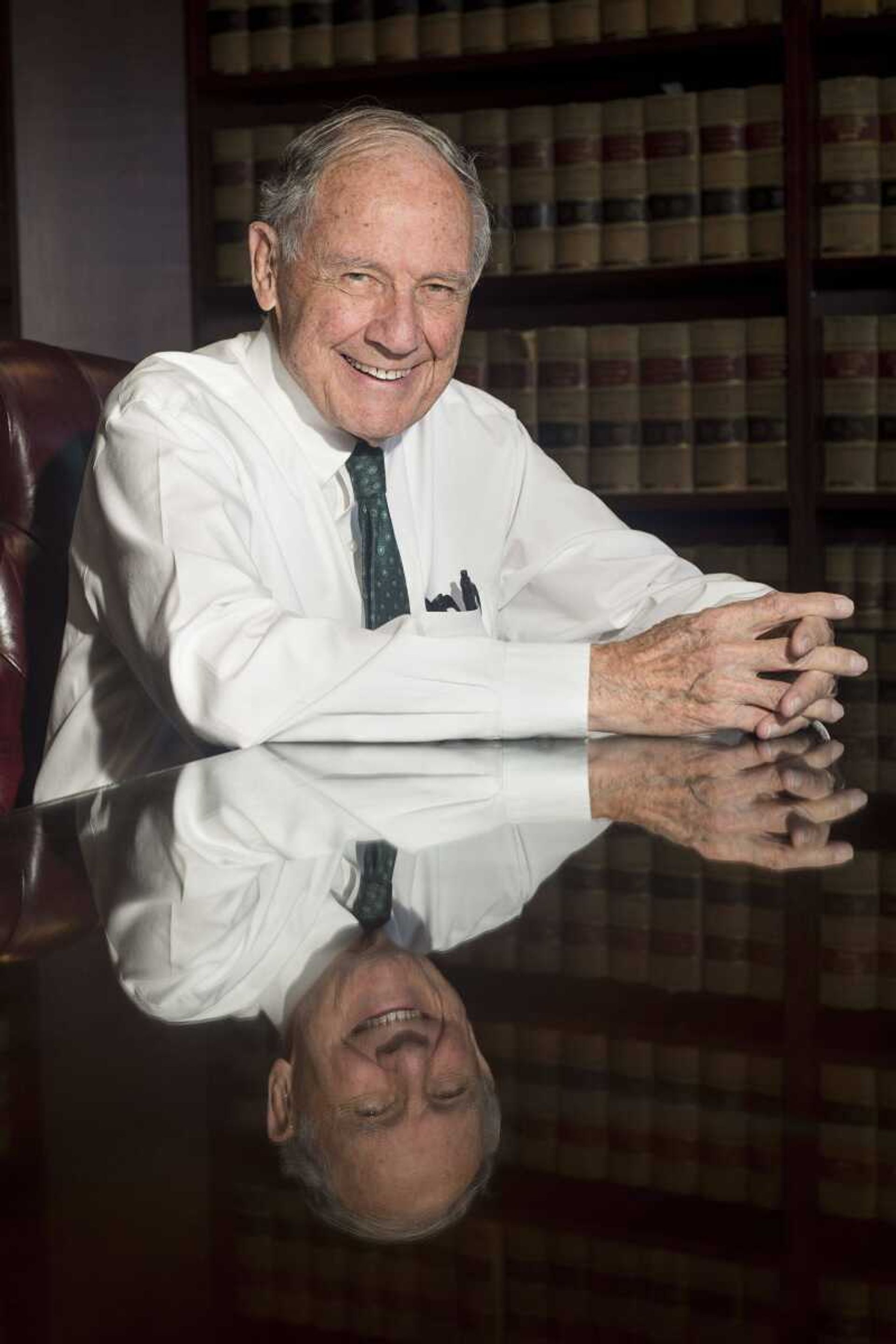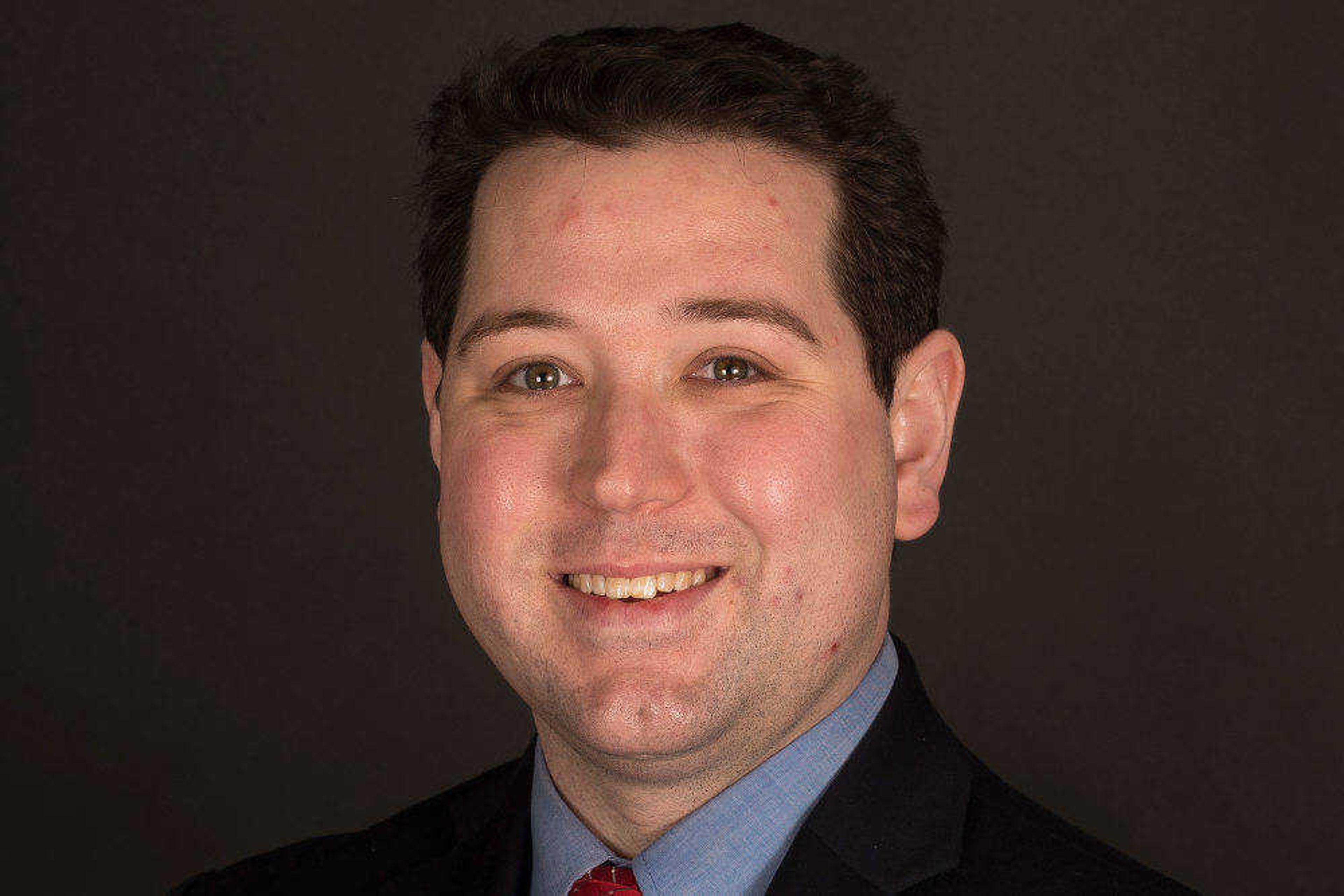Stephen Limbaugh Sr., back in Cape, shares wisdom
You won’t find many people of note more unassuming, yet fascinating, than Stephen N. Limbaugh Sr. Limbaugh, 91, moved back to his hometown of Cape Girardeau on June 1 after four decades as a federal judge and attorney in St. Louis. In 1983, Limbaugh was appointed by President Ronald Reagan to the U.S. District Court for both the Eastern and Western Districts of Missouri ...
You won’t find many people of note more unassuming, yet fascinating, than Stephen N. Limbaugh Sr.
Limbaugh, 91, moved back to his hometown of Cape Girardeau on June 1 after four decades as a federal judge and attorney in St. Louis.
In 1983, Limbaugh was appointed by President Ronald Reagan to the U.S. District Court for both the Eastern and Western Districts of Missouri. He served until July 31, 2008, when his son Stephen Limbaugh Jr., appointed by President George W. Bush, assumed the judgeship. Federal statute prevents father and son from serving on the same court.
Since 2008, Limbaugh has worked as an attorney at Armstrong Teasdale in St. Louis focusing on arbitration, mediation, estate planning and testifying as an expert witness on legal malpractice cases. He now focuses on these areas at the Limbaugh Firm in Cape Girardeau, which is where I met him Wednesday afternoon.
As he entered the firm’s library where I waited, Limbaugh pointed out the books on the shelves. Lawyers today, he said, don’t use the hard copies very often. They pull up the information digitally. But Limbaugh still finds the books useful. The library certainly made for an impressive photo background as Southeast Missourian photographer Ben Mathews convinced Limbaugh to pose. It took some convincing, but Limbaugh agreed.
Rush H. Limbaugh, Stephen Limbaugh Sr.’s father, worked until he died at age 104. And like his father, for whom the federal courthouse in Cape Girardeau is named, Limbaugh has every intention to continue his legal work.
Common sense goes long way
Reviewing the archived Southeast Missourian stories about Limbaugh, I started to notice a trend. When asked, “What makes a good judge?” Limbaugh would find a way to include something about “common sense.”
Thirty-five years later, the answer varied somewhat but still carried the theme.
“A good general background,” Limbaugh told me. “I think it’s nice if you can have a liberal arts education background so you know a little smattering of science, mathematics, literature, athletics, music. Just have that nice knowledge. And your ability to be objective. And that’s impossible sometimes, in today’s world especially. If you have that and the ability to talk on your feet or talk sitting down.”
He noted his father once said, “To be a good lawyer, you spend two thirds of the time practicing law and one third thinking.”

It wasn’t the only thing he learned from his father, who grew up very poor but wealthy is wisdom.
“Hard work, independence and objectivity,” Limbaugh listed as things he learned from Rush H. Limbaugh. “Willing to listen to other people’s points of view. In other words, willing to listen, instead of what lawyers mostly do — talk. Listen some, you learn from it.”
A good work ethic, Limbaugh said, is also an important component to being a good judge.
The most challenging part of being a judge to Limbaugh? Sending people to the penitentiary.
“It’s gotten to be a mill. One of the things now, and it’s worse now than when I was there … the U.S. attorneys’ policy is to file more gun cases than was ordinarily filed. Most of those could have gone to the state courts. I think they’re filing them because the public demand is such that these people be taken off the street. And the feds can do it quicker and simpler than the state courts can. They’re really overloading the criminal system in the federal court,” he said.
But there’s no easy solution. It’s just the facts of where we are in society, he said.

Becoming a judge
Limbaugh said he received one phone call from President Ronald Reagan from Air Force One informing him he had been nominated for district judge. Other than briefly meeting the Gipper at a social gathering, that was his only communication with the commander in chief.
These days, the confirmation hearings for judges have turned into TV dramas. Limbaugh said his, however, was somewhat anti-climatic.
“I was a little disappointed because I don’t think I was interrogated more than 15 to 20 minutes at the most,” Limbaugh said. “The guy after me was named Pasco Bowman, and he was the dean of the law school at the University of Missouri-Kansas City. He had been a professional educator all his life. He was a Reagan appointee as a purported conservative academician. And so they really went after him.”
Limbaugh, not so much. Even the ultra-liberal Ted Kennedy was “very cordial,” Limbaugh added.
“They ordinarily do not waste a lot of time with district judges,” he said. “They are more concerned with courts of appeal and the Supreme Court.”
He said about 7,000 cases get to the Supreme Court by what the law calls a writ of certiorari. The court may only hear about 300 of these, leaving the balance to a lower court. In many cases, the law is decided by the court of appeals.
Limbaugh’s nomination was championed by Republican Sen. Jack Danforth. Missouri’s other senator at the time, Democrat Sen. Tom Eagleton, didn’t champion Limbaugh’s nomination but he also didn’t obstruct it, Limbaugh said.
There are terms used frequently such as “a living document” when referring to the liberal position of the Constitution, or textualist, a term often associated with more conservative justices such as the late Antonin Scalia. But for Limbaugh, it’s really about stare decisis, the Latin term used in the law when referring to precedent.
“My judicial philosophy is stare decisis, follow the law,” he said. “I feel though, and, of course, if I was a candidate for appellate judge this would work against me — I feel there can be some extraordinary circumstances where the law should change. Not the Constitution, but the interpretation could be subject to a different point of view. But my philosophy is it has to be very extraordinary.”
Should you bring your personal views to a legal decision?
“You should not,” he said. “But human nature being what it is, it’s difficult to avoid even at the trial level,” Limbaugh said, noting that’s why the Senate confirmation process is important.
Does any one branch of government have too much power? It’s a question brought up from time to time. But the reality, Limbaugh said, is all three branches have tremendous power.
“One says the other two have too much power. Each one of the parts of government — Congress, president, judicial system — they all have so much power it’s immeasurable. And they like to exercise it, perhaps the president more than anybody. But every president has exercised it, mainly by executive order.”
One point of note, however, is how Congress, the branch that appropriates funds, has authorized some administrative agencies to fund the government in some cases instead of the legislative body itself.
The Limbaugh name
Of course, anytime you mention the name Limbaugh, people think about conservative radio talk show host Rush Limbaugh (who is actually Rush Limbaugh III, or, as some refer to him, Rusty).
“The family gets together about three times a year,” Limbaugh said. “There are about 25 of us. You’d be surprised, maybe, but Rush is pretty docile. To his credit, he listens to the family. He doesn’t always follow,” he qualified with a laugh. “We trade a lot of family points of view. We’re a close-knit family.”
Stephen Limbaugh Sr. may be one of the more well-versed individuals on local history. After he graduated high school in May 1945, he enlisted in the Navy. He was 17 years old.
Shortly thereafter, the war was coming to a close. Though never assigned a ship, he remained in the reserves for 12 years.
Limbaugh considers himself fortunate, noting a first cousin who was three years older and was killed in the Battle of the Bulge when a German howitzer shell struck his tank.
“Everybody had that exposure,” Limbaugh recalled of the war days.
During World War II, he said, it was just assumed you would serve your country. Some had a medical exemption and lawyers could choose to join the FBI. But it was your job.
“The patriotism was just sky high. People in Cape Girardeau would get a note from the war department, ‘Your son’s missing in action.’ It hit everybody across the country,” he said.
Limbaugh gave remarks of high praise to military from all wars, but especially the World War I veterans.
“I think the most patriotic people I’ve ever known in my life were World War I veterans,” he said. “They were something else.”
Limbaugh is well spoken when it comes to American history, particularly the Revolutionary War.
At a 2012 Memorial Day speech in Cape Girardeau, Limbaugh talked about the signers of the Declaration of Independence. How the men came from different backgrounds and sacrificially gave of themselves in the name of freedom. It wasn’t the first time Limbaugh had shared that particular speech, but his passion and deep love of country was evident.
“You know you have to have a government,” Limbaugh told me this week. “It’s either a dictator or a monarch or constitutional form of government or some other form. You want the best that will hopefully be the best for everybody. Those people [the signers] were just amazing with what they came up with.”
As we wrapped up the interview, I shared with Limbaugh that I had the honor of receiving the Rush H. Limbaugh Scholarship for two years at Southeast Missouri State University. I appreciated the scholarship, but looking back, I consider the value to be more than monetary. It represented a Cape Girardeau icon who made a difference and left a legacy. A legacy Stephen Limbaugh Sr. has carried on.
Welcome back to Cape Girardeau, sir.
Lucas Presson is assistant publisher of the Southeast Missourian.
Connect with the Southeast Missourian Newsroom:
For corrections to this story or other insights for the editor, click here. To submit a letter to the editor, click here. To learn about the Southeast Missourian’s AI Policy, click here.











